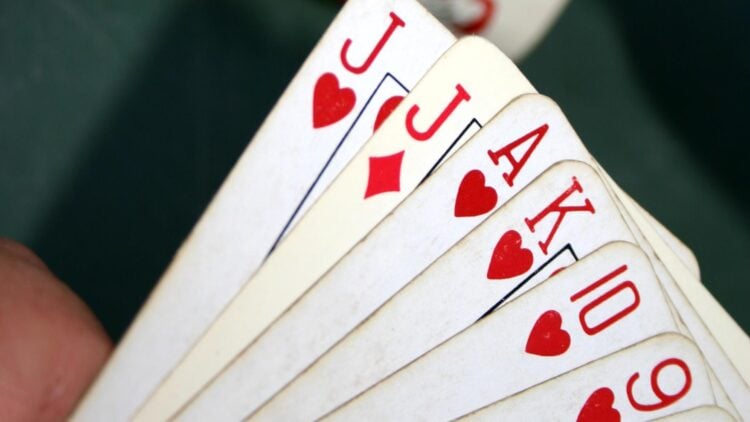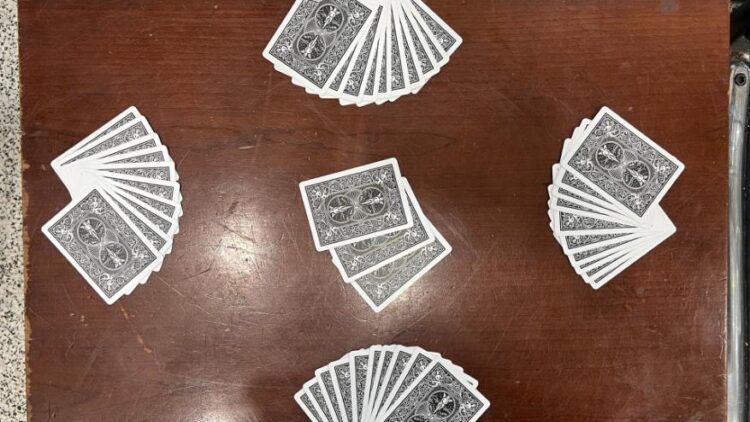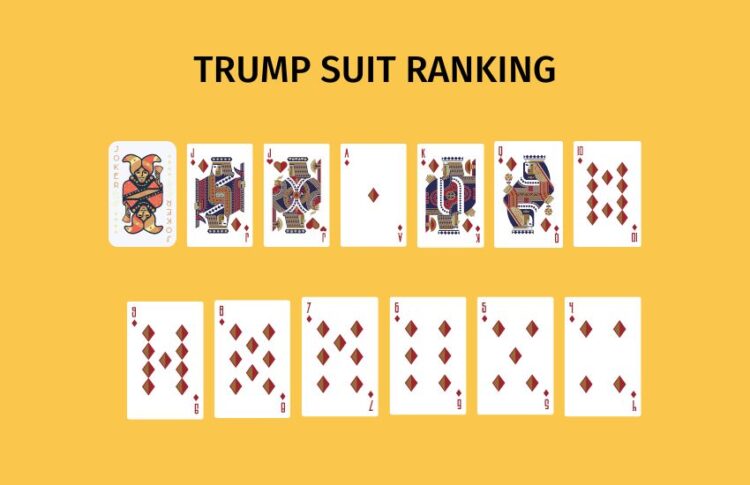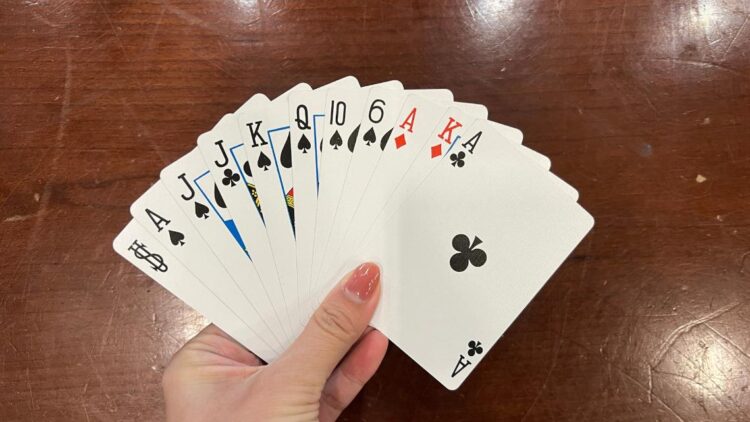
OBJECTIVE OF 500 CARD GAME: Reach 500 points first.
NUMBER OF PLAYERS: 2 to 6 players
MATERIALS OF 500 CARD GAME: Modified 43-card pack
TYPE OF GAME: Card game
AUDIENCE: Teens and adults
OVERVIEW OF 500 CARD GAME

Despite 500 being the official national card game of Australia and New Zealand, it was actually developed in the United States and copyrighted there in 1904. The game’s name is a reference to its objective: be the first player or team to reach a score of 500 points. This super fun card game is a variation of Euchre with some changes.
500 is generally a four-player game, but it can technically accommodate anywhere between 3 and 6 players if needed.
In this card game, you earn the points you need to win the game by winning tricks, or rounds. Below, we’ll go over everything you need to know to play and tally up points when playing the 500 card game. With the help of the rules below as well as the strategies we’ll outline, you’ll be winning the 500 card game in no time at all!
Note: We’ll be going over the popular four-player Australian version of this card game below.
SETUP FOR 500 CARD GAME

Before we begin, let’s set up for the 500 card game.
PLAYERS & CARDS
To start, you’ll need four players to play this game. Divide the group into two teams of 2, with teammates sitting across from each other on the table.
To play the 500 card game, you’ll need a modified card deck that consists of:
- A, K, Q, J, 10, 9, 8, 7, 6, 5, 4 in red suits
- A, K, Q, J, 10, 9, 8, 7, 6, 5 in black suits
- One Joker referred to as a bird. (Australian card decks depict a Kookaburra as opposed to a Jester)
In other words, you remove the 2, 3, and 4 of the black suits and 2 and 3 of the red suits, plus one Joker. This should leave you with 43 cards.
CARD RANKINGS
The card rankings in 500 can get confusing, so pay attention! First of all, at the beginning of each game, during the bidding section, you will decide on a trump suit. We’ll go over that more in detail below.
In the trump suit, the highest card is the Joker, then the jack of the trump suit (also called the right bower or RB), then the other jack that is the same color (also called the left bower or LB). The ranking is therefore Joker, RB, LB, A, K, Q, 10, 9, 8, 7, 6, 5, 4. Trump suits outrank the others.
I know, confusing, right? Here’s a visualization to help:

Cards not in the trump suit have a normal ranking: A, K, Q, J, 10… etc.
THE DEAL
Choose the initial dealer randomly. The dealer shuffles and cuts the cards. Then, they must deal each player 10 cards and place 3 face-down cards in the middle. These three cards make up the kitty.
The pattern of dealing is as follows:
- 3 cards to each player
- 1 card to the kitty
- 4 cards to each player
- 1 card to the kitty
- 3 cards to each player
- 1 card to the kitty
And that concludes the deal!
THE BIDDING
Before we dive in, let’s review some vocabulary. A trick refers to a round or unit of play on a hand within a trick-taking game. Tricks are evaluated to determine a winner or taker.
And now for the fun part! Everyone should take a look at their own hand of 10 cards. Bidding starts with the player on the dealer’s left and moves clockwise.
There is an order of seniority when it comes to suits in the 500 card game:
- Spades
- Clovers
- Diamonds
- Hearts
You’ll also see this seniority in the score table below.
HOW TO BID IN 500
The potential bids are:
- The number of tricks (minimum of 6) and the trump suit, this bid indicates the total number of tricks they and their partner will take (or win) plus the trump suit for that hand.
- A number (minimum of 6) of “No Trumps,” referred to as “No-ies.” This bid indicates a player and their partner will try to win with that number of tricks without a trump suit.
- Misère (Nullo, Nello, Nula) is a contract to lose all tricks. The player who bids this plays alone, with the partner dropping out. The bid means the player doesn’t plan on winning any tricks. Misère is French for extreme poverty.
- Open Misère is similar to a misère, but the contractor’s hand is displayed face-up after the first trick.
- Blind Misère is the same bid as misère but can only be bid before the player looks at their hand.
- Bids can be made Sans Kitty, meaning the players will fulfill the contract of their bid without the kitty.
Not all players have to bid. If players do not want to, they can also pass at this point of the game. If all players pass, reshuffle and redeal the cards once again.
After a bid, each following bid must be higher. A higher bid is either more tricks or an equal number of tricks but in a higher suit. The suit rankings outlined above apply. The lowest bid is 6 Spades and the highest possible bid is 10 No Trumps.
A Misère is higher than a bid of 7 and lower than a bid of 8. You can only bid a misère after someone bids a 7.
An Open Misère is a bid higher than the 10 of diamonds and lower than the 10 of hearts. You do not need to wait to make this type of bid; it can even be the first bid if you’re feeling super confident!
If you pass, you are not permitted to bid again. The bidding continues until all but one player has passed. The highest bid becomes a contract the bid winner (or contractor) has to fulfill.
Note: There is an American variation to bidding where there is only one round of bidding and whoever bids highest becomes the contractor.
HOW TO PLAY 500 CARD GAME

The contractor (the winner of the bid) starts by picking up the three cards in the kitty and putting them in their hand. They will then discard 3 cards they do not want and place them face down on the table. If the bid was Misère or Open Misère, the contractor’s partner does not participate in gameplay and places their cards face down on the table for this hand.
The suit that the contractor bid is now the trump suit for this hand.
The contractor initiates the first trick and other players follow suit in a clockwise direction. Keep these rules in mind when laying down cards:
- A player without cards in the leading suit may play any card.
- But if a player does have a card in the leading suit, they must play that card.
- The highest trump wins (takes) the trick.
- Remember: the Joker, RB, and LB are all worth more than even the Ace of the trump suit!
- If there are not trumps played, the highest card of the lead suit wins.
- The winner of a trick leads in the next trick and takes the cards they’ve won and keeps them in front of them.
- If the contractor bid Open Misère, after the first trick, they must expose their hand to the rest of the players laying face-up on the table for the rest of the hand.
Continue playing in this manner until all players complete all ten tricks. After all ten tricks are played the hand is scored.
SCORING THE 500 CARD GAME
After playing all ten tricks in a hand, it’s time to score the game! Teams keep cumulative scores which are added to or subtracted from with each hand.
Here, you can find the scores for each bid:
| TRICKS | SPADES | CLUBS | DIAMONDS | HEARTS | NO TRUMPS | MISERE | OPEN MISERE |
| SIX | 40 | 60 | 80 | 100 | 120 | 250 | 500 |
| SEVEN | 140 | 160 | 180 | 200 | 220 | ||
| EIGHT | 240 | 260 | 280 | 300 | 320 | ||
| NINE | 340 | 360 | 380 | 400 | 420 | ||
| TEN | 440 | 460 | 480 | 500 | 520 |
If the bid was a suit or No-ies contract, the bidding team wins if they take at least the number of tricks they bid. Contractors score the corresponding number of points above. There are no additional points if they take more tricks than bid unless they win every trick.
If your team does win every trick, this is called a slam. If a contractor is able to make a slam, they score a flat 250 points if their bid is worth less than that. However, if the points corresponding to the bid are worth more than 250 points, there are no special points. The team simply wins their bid as normal.
If a contractor does not take enough tricks for their bid, they score minus the point value of their contract. The other players score 10 extra points for every trick they win.
If the contract is a Misère and the contractor loses every trick, they accumulate the points for that bid. If they win a trick, they subtract the value of the bid from their points. Other players do not gain or lose extra points.
END OF GAME
The game ends when a team scores 500 or more points, with the first team reaching 500 points the winning team! A team can also win if the opposing team scores negative 500 points and automatically loses.
If you love playing 500, you’ll also love these other trick-taking card games, such as Spades and Bridge!
VARIATIONS AND HOUSE RULES OF 500 CARD GAME
Looking for ways to spice up the 500 card game? We’ve got you covered with this list of variations and house rules you can employ at your discretion. We also include the game rules for how to play 500 with 3, 5, or 6 players.
- Misère bids are not permitted whatsoever.
- Misère may be bid without a 7 bid.
- The Joker may only be led in the first or last trick.
- The Joker loses its power on the first or last trick.
- You may not raise your bid after everyone else has passed.
- If you are at a score of 490 (or 480), you cannot get points for winning a trick against a contractor.
- In the American version of the game, the kitty is called the widow.
- To play 500 with 3 players, deal a pack of 33 cards, with the lowest card of each suit being a 7. The contractor plays alone, with the other two players forming a temporary partnership. Scores are separate.
- To play 500 with 5 players, deal a pack of 53 cards, which is a full deck of cards, plus a Joker. In this version, the contractor forms a temporary partnership with another player by nominating a specific card. The identity of the partner remains a secret until they are revealed during gameplay. The contractor may also choose to play alone. If playing alone, the contractor wins or the full point value, but if playing with a partner, they divide the wins or losses by 2.
- To play 500 with 6 players, deal a pack of 63 cards, which includes 11s and 12s of all suits and 13s of the red suits.
500 CARD GAME STRATEGY
There are many different strategies and tricks you can employ when playing a fun trick-taking card game like 500. You will develop your own strategy in time, but if you’re new to the game or looking for a way to improve your game, here are our top 500 card game strategies you’ve got to know!
- Call Misère when you can: You have a much higher chance of winning a misère bid over a normal bid – especially when you don’t have a strong hand to begin with!
- Don’t call No Trump unless you have the Joker or 3 Aces: If you can, avoid calling No Trump unless you have a VERY strong hand, such as the Joker or 3 Aces as well as other strong supporting cards, such as Kings.
- Don’t fight with your partner over tricks: While your first instinct may be to win all the tricks that you can, support and lean on your partner from time to time. After all, you’re in this together!
- Win contracts to win the game: Of course, you can still win a game of 500 without making a contract, but the fastest way to win is to make contracts. So, don’t be afraid to bid!
- High bids with only 6 or more cards in that suit: Try to avoid making super high bids on your hand unless you have a very strong hand in the suit you’re bidding. Don’t simply rely on the kitty! While the kitty may end up having strong cards, it’s just as likely to have useless cards.
FAQ
Are Euchre and 500 the Same Game?
500 is a game that was born out of Euchre. So, if you enjoy playing Euchre, you’ll love this slightly different variation of a trick-taking card game.
Can You Play 500 with 2 Players?
Unfortunately, no. You can only play the 500 card game with 3 to 6 players.
Is Bridge Similar to 500?
Bridge and the 500 card game are both incredibly similar trick-taking games. If you love playing either game, you’ll enjoy the other, too. You can also use similar strategies in both card games.
- 25 Top Birthday Party Games for Kids - July 23, 2024
- 40 SUPER FUN GIRLS NIGHT GAMES - July 16, 2024
- 40 Exciting Games to Play When You Are Bored - July 9, 2024
In nullo I’m unclear as to when the joker may be played. does the opponent have to be out of suit before they lead the joker?
Hi Thyra, in Nullo when a joker can be played depends on if the contractor declares the suit it belongs to. If the contractor did declare a suit then there is no restriction on when the joker can be played. If, however, the joker was not declared to a suit then it belongs to no suit and is always the highest-ranking card. In this case, the joker must be played to a trick if you are unable to follow suit. To lead a joker a player must declare it as a suit that has not previously led a trick. If this is not possible, then the joker must be played in the last trick, if not before.
hi thanks for all these great tips. can you tell me the best way to play 6 handed ? two teams of 3 or 3 teams of 2
thanks
Hi Sam, teams of two are always better gameplay-wise in my opinion, but both options are totally valid forms of play. I would suggest you give both a try and see which you like best! Happy Gaming!
When we played this game, we removed the 2 and 3 and the joker was part of the kitty – 44 card and virtual joker. Whoever won the bid would pickup the kitty (4 cards) and discard 5.
I learned this from my French-Canadian family in Sudbury, Ontario Canada. I’ve seen 5 generations of my family (and other families) play with these rules.
Any insight?
Pierre
Hi Pierre, the closest I could find was a variation called Canadian Five Hundred. it consists of a 46-card deck, with no 2s or 3s and two distinguishable jokers. The jokers are ranked as the highest trumps. It’s a game made for 4 players in partnerships of 2 and each player is dealt 10 cards each. The kitty consists of 6 cards and when won the player must also discard 6 cards from hand. The gameplay seems consistent with traditional gameplay. I hope this helps!
When playing nullo, the player sitting out passes a low card to his partner who won the bid and then sits out. Does the partner get to see that card and fit it in with his hand before making his discards or does he discard first and then get a card from his partner?
Hi Char, the only time I can find that a player passes a card to their partner is for a bid variation called slam. It specifies that a slam hand can only be called for a 7-trick contract and not for anything over 7 or for a misère (nullo) bid. it does state however that the partner passes the card to the player and then the player discards to hand size. I hope this helps in some way. Please let me know if I can be of any further assistance.
Thank you for taking the time to research but it is specifically nullo that I am questioning. Would you let me know if anything surfaces. I can’t stand to play unless it is by the rules.
Hello Char, I will see if I can locate anything for Nullo Pecifically and will message back under this thread if I can find anything.
If a declarer fails to discard 3 cards ,then discovers at end of game bidding 7 loosing
4 tricks. Is the game voided or does declarer go down .
There are no official rulings for misplays. I would void the round and start over but it should be up to your play group as a whole how you choose to deal with this issue. Happy Gaming.
Hello,
Question about what happens to the blind when a player bids nullo.
I’ve heard that it’s passed back and forth somehow but I’ve always played that the bidder treats it like a regular blind-picks it up then discards five cards.
Hi Renee, I am not familiar with the variation you mentioned. In classic rummy 500, the blind (or kitty as it’s traditionally referred to in this game) is used the same for all bids.
I’m from Iowa. The version we play around here is that for a regular nullo bid (250 points), your partner passes you one card from their hand and you pick up the blind. (We play without the black 4’s so it is a 3 card blind) You would then discard 4 cards, bringing your hand back down to 10. Your partner sits out.
The only time you would pass the blind back and forth is if you bid nullo, and your partner raised it to double nullo. Instead of your partner passing you a card, you would pick up the blind, make your discards, then pass your discards to your partner, who picks them up, and can change any of them out for their own discards. It’s incredibly difficult to make double nullo, so this is a very rare situation.
Hello Amber, thank you for your useful information. I’m an avid Australian player. I notice in your “variations” section you put “you may not raise your bid after everyone else has passed.” Does that mean upping your own bid when your the last bid standing is the default? I grew up with the rule that you could increase your own bid as long as it was before looking at kitty and i think it makes for a superior game. But i meet a lot of resistance to this method. Can you direct me to any definitive ruling on increasing your own bid once all other players have passed?
Hello Bergen, in my research I found an unnamed variation that states that a player may not increase their bid if they were the only player to participate in the bidding. However, if others participated in the bidding and passed then the contractor (the last player not to pass) may increase the bid. This adds additional variations that state if the bid changes the suit used in the bid then the other players have another chance to bid, but if the number of tricks in the only thing increased then the other players would remain out of the bidding. This is not a well-known variation, it would seem.
A question on a no trump bid. Can the joker be played at any time or only when the holder is out of the suit played?
Hi Robert, when a no trump bid is made, the joker is the only trump card, meaning it can be played at any time and is the highest-ranked card. I hope this helps.
a question no biding a player no 7 trump the next bid 7 clubs can that say pass or dues that player have to 8 ?
Hello DeWayne, the player may pass but then will be out of the remainder of the bidding round.
My question is to do with Misere. Is the person with the highest card deamed as the winner of the trick and therefore leads for the next hand or is the person with the lowest card classed as the winner of the trick and therefore leads the next trick?
Hi, tricks are won the same for misere as with other bids. The highest trump wins, and if no trumps were played the highest ranking cards wins the trick.